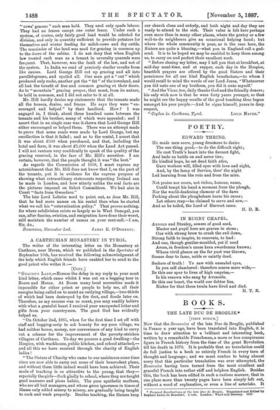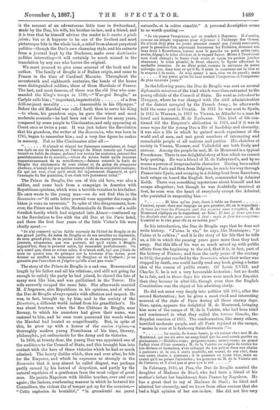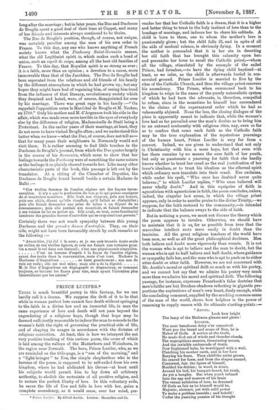BOOKS.
THE LATE DUO DE BROGLIE.*
[FIRST NOTICE.]
Now that the Souvenirs of the late Doe de Broglie, published in France a year ago, have been translated into English, it is time to draw attention to a brilliant and interesting book, written by a remarkable Frenchman, a more or less conspicuous figure in French history from the time of the great Revolution till his death in 1870. It is probable that no translation could do full justice to a book so entirely French in every turn of thought and language ; and we must confess to being almost sorry that this particular translation was ever attempted, the Souvenirs having been turned from the most excellent and graceful French into rather stiff and helpless English. Besides this, the book has been edited in such a curious manner, that in one place more than twenty pages have been simply left out, without a word of explanation, or even a line of asterisks. It
• Personal Recollections of the late Due de Broglie. Translated and Edited by Raphael Ledo. de Beaufort. 2 vols. London: Ward and Downey. 1887. is the account of an adventurous little tour in Switzerland, made by the Due, his wife, his brother-in-law, and a friend, and it is true that he himself advises the reader to le saute,- a pieds joints; but as it happens to be one of the liveliest and most picturesque bits in the whole book, a relief from almost perpetual politics—though the Due's own charming style, and his extracts from a journal kept by the Duchesee, make even doctrinaire polities interesting—it will certainly be much missed in the translation by any one who knows the original.
We must proceed to give some account of the book and its author. The family of Broglie is of Italian origin, and came to France in the time of Cardinal Mazarin. Throughout the seventeenth and eighteenth centuries, the heads of the house were distinguished soldiers, three of them Marshals of France. The last, and most famous, of these was the old Doc who com- manded the King's troops in 1789,—" War-god Broglie," as
Carlyle calls him ; " important, impenetrable of a firm drill-serjeant morality inaccessible in his Olympus."
Before the old Marshal was called forth then to serve his King —to whom, his grandson says, he gave the wisest and moat moderate counsels—he had been out of favour for many years, compared by some people to Cincinnatus, and only appearing at Court once or twice a year. It was just before the Revolution that his grandson, the writer of the Souvenirs, who was born in 1785, began to remember him ; and a very fine figure he makes in memory. Not so like Cincinnatus after all:-
` n'avait ni depose lee faisceaux consnlaires, ni forge
son epee en sec de charrue, et renvoye do Sinai remain qui raurait tronve en habit de cheese, galonne sur toutes les coatures, entoure des gentilsbommes do In contrite,—virus du memo habit galls tesnient respeetuansement de sa munificence,—faisant retentir In font de Broglie des aboiemente de cent ehiens et du galop de cluquante chevaux, n'aarait ate quo mediocrement edifie de sa simplicite rustique. Ce gni est vrai, cent qu'il avait ate injuatement diegracie, et mil l'exemple du fier patricien, it on utak tees justement irrite."
The Prince de Broglie, the son of this old hero, was also a soldier, and came back from a campaign in America with Republican opinions, which were a terrible vexation to his father. He once wrote to the young man—we do not find this in the Souvenirs :—" Si cette lettre ponvait vons apporter des coups de baton je vons en enverrais." In spite of this disagreement, how- ever, the Prince and his wife, Mademoiselle de Rosen—of a noble Swedish family which had migrated into Alsace—continued up to the Revolution to live with the old Due at his Paris hotel, and there the first four years of the little Victor's life were chiefly spent :—
"Je n'ai conserve mean foible souvenir do l'hdtel de Broglie et de non grand jardin, do salon de Broglie et de see meubles en tapisserie, de mon grand-pere, de sa petite taille et de sa courte perruque. Je jarerais, neanmoins, qua eon portrait, tel qu'il exists A. Broglie aujourd'hni, dans Is premier salon, lui ressemble parfaitement. On m'a coati que, dans no wean) salon, it m'avait suffi, age que j'etais de trois on quatro am, de grimper sur In traverse d'uu term, pour dormer vu sonffiet an %minima= do Berghen et de Corbaoh ; je no garantis pas l'anecdote et respire qu'elle neat pas vraie."
The story of the Prince de Broglie is a sad one. Renounced at length by his father and all his relations, and still not going far enough to satisfy the party he had joined, he shared the fate of many men like him, and was guillotined in the Terror. His wife narrowly escaped the earns fate. She afterwards married M. d'Argenson, also Republican in his opinions, and of whom the Due de Broglie always speaks with affection and respect. He was, in fact, brought up by him, and in the society of the Directoire, a different World indeed from his grandfather's. He was about fourteen when the fine Chateau. de Broglie, near Bernay, to which his ancestors had given their name, was restored to him, and he once more possessed the woods where the Marshal had hunted so magnificently. But, in spite of this, he grew up with a horror of the ancien regime,—a thoroughly modern young Frenchman of his time, literary, philosophic, yet enthusiastic for the Army and its victories.
In 1809, at twenty-four, the young Dec was appointed one of the auditeurs to the Council of State, and this brought him into contact with the hero of those victories which he had so much admired. The hearty dislike which, then and ever after, he felt for the Emperor, and which he expresses so etrongly in the Souvenirs that it may almost be called disgust, was perhaps partly caused by his hatred of despotism, and partly by the natural repulsion of a gentleman from the most vulgar of great men. He paints Napoleon with lifelike touches, over and over again ; the furious, overbearing manner in which he lectured his Councillors, the violent fits of temper got up for the occasion,— " Cette explosion de brutality;" "la groseibrete me parut
naturelle, et la copra simulee." A personal description seems to us worth quoting :—
" Je vie passer l'emperanr, qui se rendait it Bayonne. Il a'arreta, comme an simple voyageur, poor dejefmer il l'auberge des Orme. Ce n'etait dejA plait ce jeune premier consul quo payola rencontre, pour In premiere foie, arpentant lestement lea Tuileries, dormant son bras droit it Bourrienne, tenant sous is gauche an petit sabre two, svelte, degage, le teint olivatre et to regard leave. Mime I resterieur teat utak change ; Is baste etait court et epais, lea petites jambes eharnues ; is taint piombe, le front chance, la figure affectant la medallic; romaine. Je no dirai point, comme is servants de notre aaberge, que, dans tont en mei' fit, it avait in couronne ear la Ora et is sceptre u in main. Je n'ai, quant A moi, rien vu de pareil ; main
it me party qu'en lei tout aentait l'empereur, et l'ompereur de plus manvais joars.
In the following years, the Due de Broglie was sent on several diplomatic missions of the kind which were then entrusted to the young officials of the Council of State. He went as intendant to Hungary, where he was charged with the civil administration of the district occupied by the French Army ; he afterwards held the same post iu Croatia. In 1811 ho was sent to Spain, in 1812 to Warsaw, in 1813 to Vienna, as Attache to a man he loved and honoured, M. de Narbonne. This kind of life con- tinued till the Emperor's abdication in 1814, and if it was in some ways for the young Due a life of hardship and obscurity, it was also a life in which he gained much experience of the world and of men, and met great numbers of interesting and remarkable people of all nations and parties. His sketches of society in Vienna, Warsaw, and Valladolid are both lively and curious. Among the people he met, M. de Montrond is a typical Frenchman. There in one delightful story of him which we cannot help quoting. Ho was a friend of M. de Taileyrand's, and by no means a person of irreproachable character. Having been exiled first from Paris and then from Belgium, he made his way through
France into Spain, and escaping in a fishing-boat from Barcelona, took refuge on board the English fleet, commanded by Admiral Keith. There was something mysterious about himself and his escape altogether ; but though he was doubtfully received at first, he soon won the heart of everybody except the Admiral, who persisted in suspecting him :—
Si bien qa'un jour, titant 1 table an dessert rewire], ayant, dans eon !engage an pen grimier, dit on le regardant Je tiens qua tons les Francais sont des coquina sans exception, M. de Montrond repliqua en Is regardant en face: Ft moi je time quo taus lea anglais sent des gene contrite it fast mais je Pia des exceptions. L'amiral no le tint pear dit et no revint pea."
In his introduction, the Dec de Broglie says that be does not write history. "J'aime la vie," he says, like Montaigne ; "je l'aime et la cultive ;" and it is the story of his life that he tells us, a life in which the passing years gave more than they took away. But this life of his was so much mixed up with public affairs from the beginning to the end, that it is, in fact, part of the history of France ; and from the early years of the century to 1832, the point reached by the Souvenirs when their writer was stopped by death, one could hardly read any book giving a better idea of the course of public events. Of Louis XVIII. and Charles X. be is not a very favourable historian ; but no doubt he is fair, and in those days his views were much less Royalist than they became in after-life, though even then the English Constitution was the object of his admiring study.
He did not enter very deeply into politics till 1815, after the second Restoration ; but he gives a most vivid and interesting account of the state of Paris during all those stormy days. Here, again, appears the delightful M. de Montrond, bringing him news of the escape of M. de la Valette, who had been tried and condemned in what they called the terrour blanche, the Royalist reaction of 1815. The condemnation, like many others, horrified moderate people, and all Paris rejoiced at the escape, "moms la cour et Is faubourg Saint-Germain :"—
Le matin, de bonne hoary, je vie entree chez moi M. de
Montrond, qui me dit avec on sang-froid quo lui seal savait gander on plaisantant :—ilabillez-vons ; preparez-voua ; armoz.vons; un grand forfeit vient d'être commis; M. de la Valette au mepris de tonics les loin divines et homainea, s'est echappe de son prison dans use chaise porteurs; et is roi, a cetto nouvelle, est moats, de son cote, dans nne sutra chaise I porteurs ; it le prewsuit en touts hate, mats on
anoint no pules° ratteindre ; les portears do M. de in Valetta out de l'avance, et it n'est pas si grout que to roi In February, 1816, at Pisa, the Duc do Broglie married the daughter of Madame de Stall, who had been a friend. of his mother's before her banishment from France by Napoleon. He has a great deal to say of Madame do Stall; he liked and admired her sincerely, and we know from other sources that she had a high opinion of her eon-in-law. She did not live very long after the marriage ; but in later years, the D uc and Duchess() de Broglie spent a good deal of their time at Coppet, and many of her friends and interests always continued to be theirs.
The Duo de Broglie's position, though, of coarse, not unique, was certainly peculiar among the men of his own order in France. To this day, any one who knows anything of French society knows what the Faubourg Saint-Germain means, what the old Legitimist spirit is, which makes such a bond of union, such an esprit de corps, among all the best old families of France. To this day, that Royalist spirit is as strong as ever ; it is a faith, more than an opinion ; a devotion to a cause, more immoveable than that of the Jacobites. The Duo de Broglie had been separated from the relations and old friends of his family by the different atmosphere in which he had grown up ; but any hopes they might have had of regaining him, of seeing him freed from the influence of that literary, revolutionary society which they despised and hated, were, of course, disappointed for ever by his marriage. There was great rage in his family :—" On rappelait l'oppoeition entre le Marechal de Broglie et M. Necker, en 1789." Only his mother and M. d'Argenson took his side in the affair, which was made even more terrible in the eyes of everybody else by the difference of religion, Mademoiselle de Stafil being a Protestant. In the earlier years of their marriage, at least, they do not seem to have visited Broglie often ; and we understand this better when we know—what the Dna, of course, does not tell us— that for many years their neighbours in Normandy would not visit them. It is rather amusing to find little touches in the Duchesse de Broglie's journal, from which the Due quotes largely in the course of his Souvenirs, which seem to show that her feelings towards the Faubourg were of something the same nature as the feelings it so plainly showed towards her. Like many other characteristic parts of the book, this passage is left out by the translator. At a sitting of the Chamber of Deputies, the Duchesse de Broglie found herself beside a certain Madame de Balbi
Ces vieilles femmes de l'anoien regime out des facous incon- oevables. Il n'y a que Is perfection du bon guilt qui pules° enseigner de si mauvaises mameres. Ella Otait son chapeau, pule son bonnet, pais son chile, disant Etouffait, qu'il fallait se deshabiller; puis elle faisait demander une prise de taboo a an depute de ea connaissance; pais elle perdait son mouohoir, et faisait demander A, sea voisins de lui en preter us. Elle avait, en tout, cettefamiliarite insolent° des grander dames d'autrefois qui se croyaient Out permis."
Certainly there was not much sympathy between this young Dachesse and the grander dames cZ'autrefois. They, on their side, might not have been favourably struck by such remarks as the following :—
" Avant-Inier, j'ai ate A la cone; et je me anis trouvee touts seals an milieu de ces vieilles figures, et vela me faisait nos certaine pour. On a roald Is roi dans eon fauteuil ; cent une physionomie singuliere.
C'est no homme d'esprit I Ia felon de fancies regime, ayant des traits dane Ia conversation, make cent toot. Madame la Duchess° d'Angonleme se tient ganchement ; son son de vole eat rode; elle eat mal miss; mails elle a de Ia dignit6
M. le Duo d'AngoulOme est degiugande et disgracieux, as remnant tonjours, se &Want lee Banes pour rire, ma's avant l'intention plus bienveillante que lee autrea."




















































 Previous page
Previous page